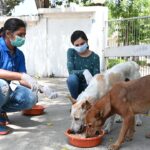Baby Monkey’s Reunion
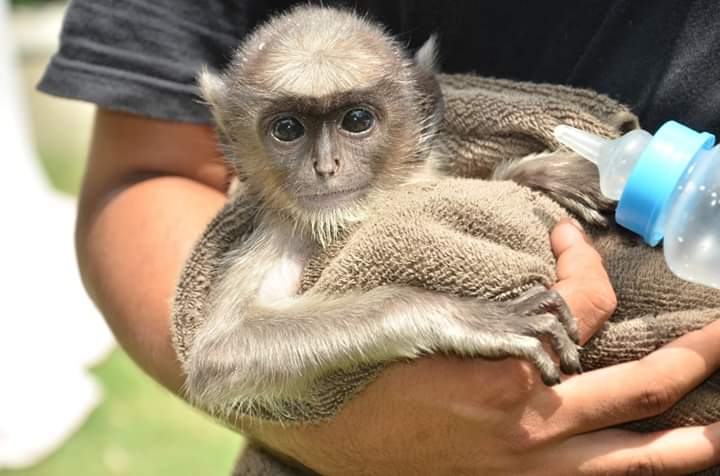
Langur is a common creature in Bharat. With the strong tail and long, slender limbs it is adept at climbing tree or buildings. They move in troops, led by the Alpha male. Langurs are seen usually as comical demons. Their antics among themselves can entertain one for long. At any time, you can see them scratching each other, whooping vociferously, making faces or even messing with the dogs while sitting atop a wall or tree! Often, the little ones enjoy pulling at each other’s tail. One of the most amazing and endearing sights is a tiny baby langur wrapped around the belly of its mother while she runs on her limbs or makes leaps. The long digits enable the baby to catch hold of the fur of mama monkey while she moves from one place to another.
The little ones depend on their mother totally during the first few weeks of their existence. Slowly, they mingle with their peers, while staying within a few feet of their mother. In some months, they grow more and more curious and begin to wander. While they get naughtier and their antics can get annoying for the adults, they maintain a comfortable distance from the adult males, never messing with them.
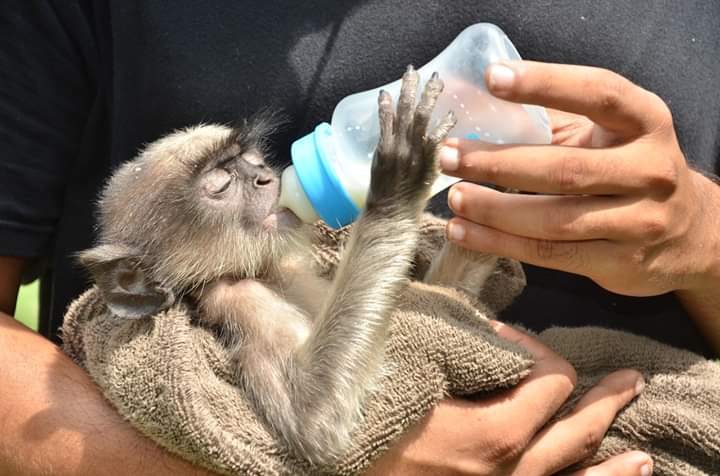
JCT came across a unique and unforgettable case about a year ago. Unlike the routine cases requiring wound treatment, this one tested our team to the hilt. A little, adorable but equally vulnerable offspring of a langur was brought to us. He was found unharmed. But the situation was perplexing. He was too young to be on his own and thus needed support. He needed nourishment and shelter. And for that he had to be kept with us in our centre.
Although langurs live around or with human habitation, they maintain a distance from them. They come under urban wildlife and are protected by the Indian Wildlife Act, 1972. Unlike a dog or cattle, they don’t get too close to people.
Wild animals, including those belonging to urban wildlife, can sustain on their own. They don’t depend on human beings. For our little soldier, it was also important he find a troop to call his own. A better way to put it is a troop should let him in. That’s uncertain as monkeys have strong filieal bonds and an outsider is usually seen as a threat (Battles between opposing groups of monkeys are well recorded.)
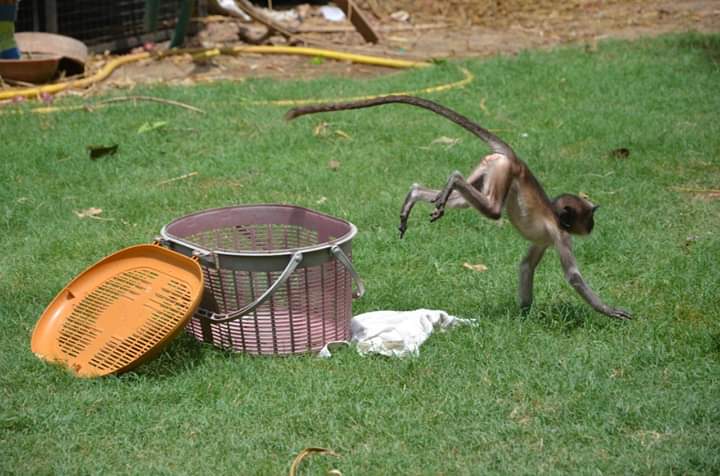
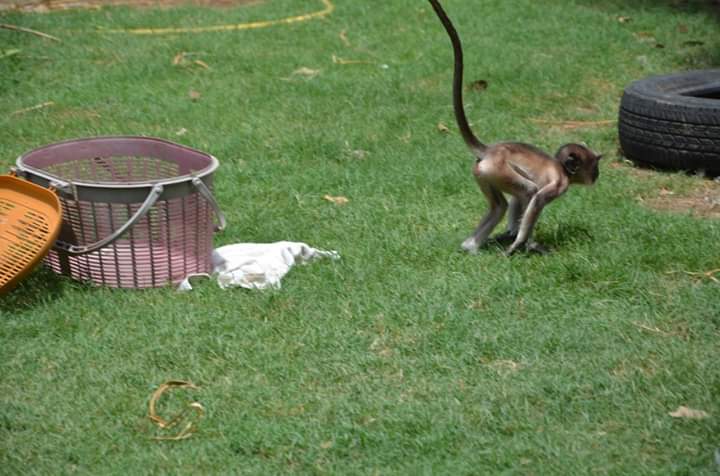
As the saying goes, ‘extraordinary circumstances call for extraordinary measures’. What ensued next was a never seen before experiment (so to say) that explored the behaviour and equation of langurs.
First of all, it was imperative to keep his interaction with humans to the minimum. A handler was assigned who alone would feed and look after him. This was to ensure he doesn’t get used to people. If a monkey gets dependent on a person for nourishment, he will never learn to forage. To be accepted as a member, he had to be like any common monkey. And common monkeys stick with the troop and find food, often stealing it from unsuspecting people!
JCT centre houses many a species. We also get visited by some very special guests every now and then. Guests with black faces, grey fur and long prehensile tails! But we had to proceed with caution. Every time that troop of monkeys came, the small cabin that held our little soldier was brought to the lawn in the backyard of our centre. There was a lot of excitement, nervousness and curiosity from both the ends. After deliberating, he would go towards a watchful member. In the beginning few weeks, this was the usual outcome- a scared leaping back to the cabin; much to the dismay of our team. But this changed. Now when he would go close to the monkeys, they would back out.
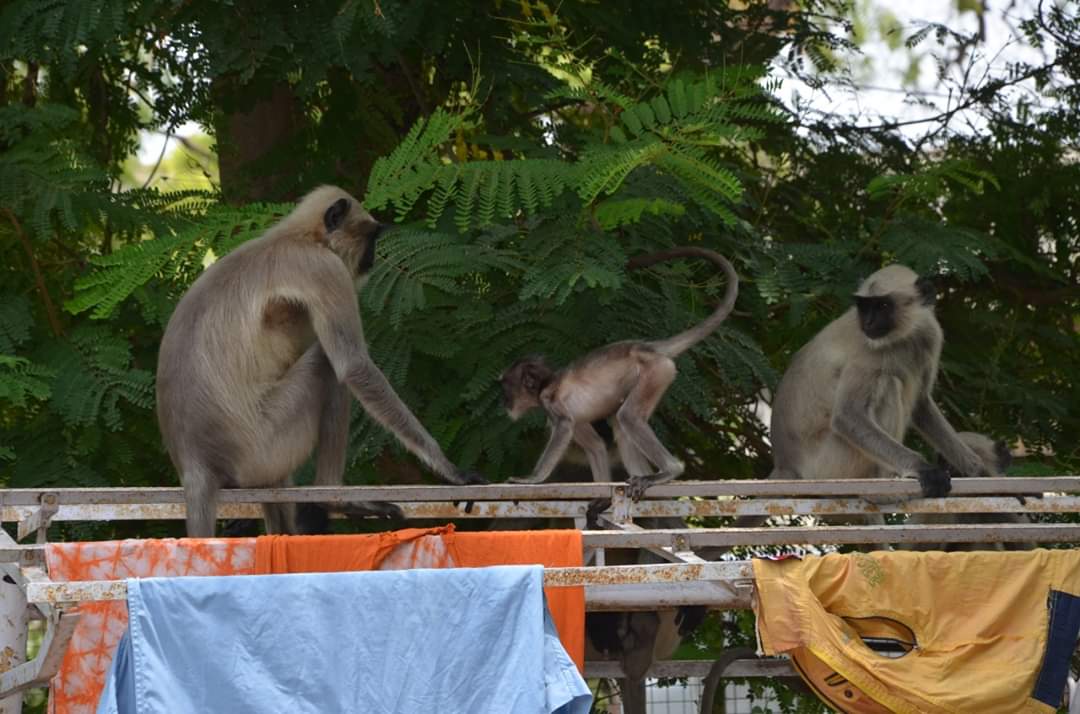
The experienced animal rescuers of team JCT deduced this was due to the human odour emanating from him. Every time he came in contact with his care taker, he would inadvertently imbibe the human odour. Monkeys have keener sense of smell than us and an unknown smell would raise their guard. Thus, his interaction was further minimized.
This worked! After some days had elapsed, little one began mingling with the members of the troop. This was an uncommon instance of a group of monkeys accepting a ‘foreigner’. As these nervous interactions began to become stronger, it was likely that he would be off with his new family soon.
And one fine day, the moment we had all been praying for happened and our little champion, tiny langur went away with his new friends! We had mixed feelings, to be honest. On one hand, the overwhelming joy of a creature returned to the wild and successful completion of an experiment, while on the the other hand, our sweetest visitor was gone. It felt like a small bereavement!
Godspeed champ!
JIVDAYA CHARITABLE TRUST IS AN NGO WORKING FOR THE CAUSE OF SPEECHLESS AND OWNERLESS ANIMALS. WE HAVE A TEAM OF VETS AND PROFESSIONALS WHO SAVE LIVES EVERY DAY.
YOU CAN BE A PART OF THE ‘GREENOLUTION’ BY DONATING. YOUR RESOURCES WILL BE PUT TO BEST USE.



